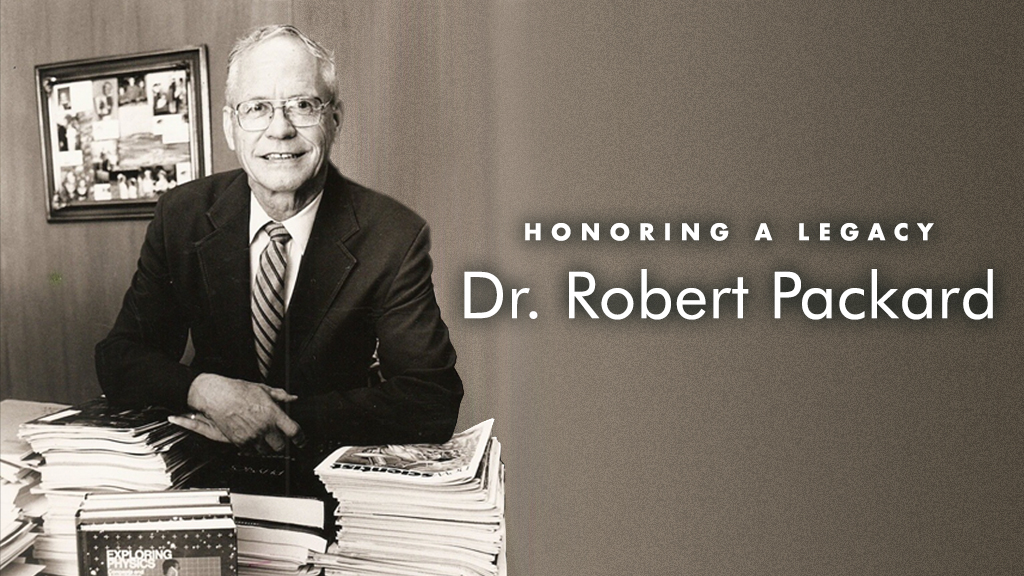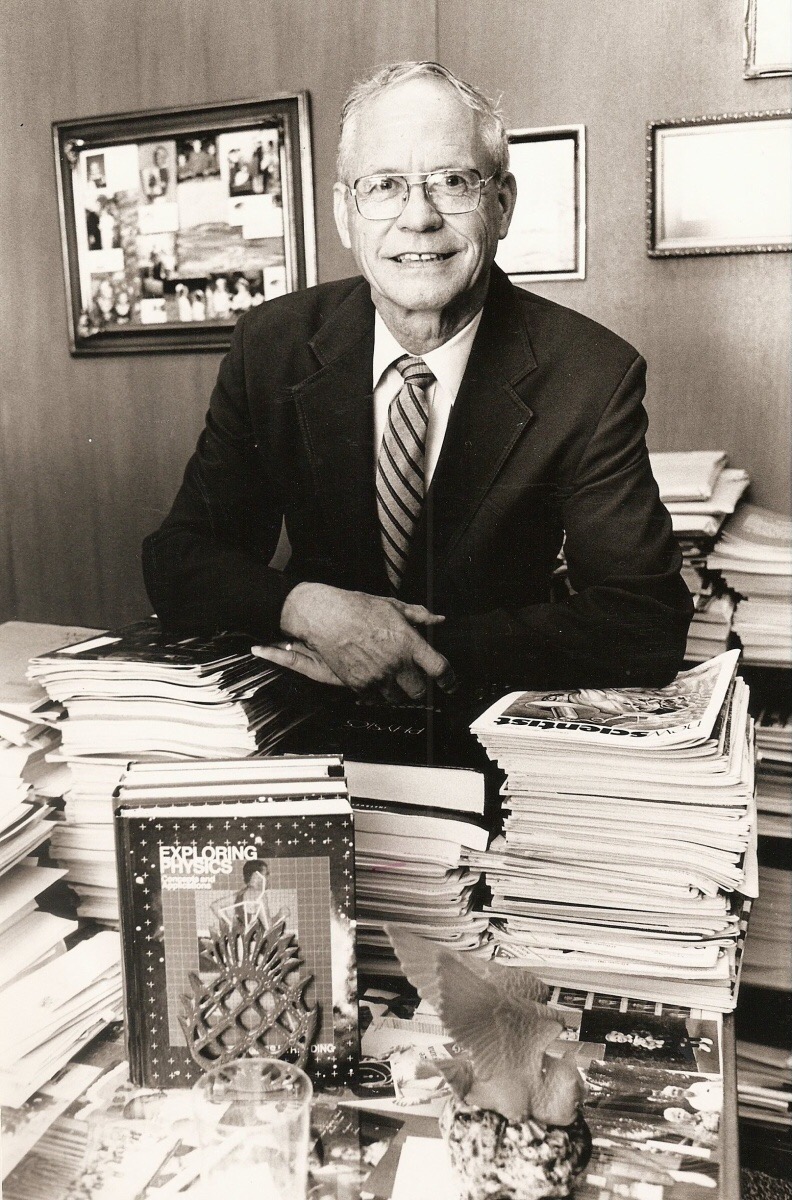Baylor Mourns Passing of Beloved Baylor Professor, Master Teacher Robert Packard


Media Contact: Lori Fogleman, Baylor University Media and Public Relations, 254-710-6275
Follow Lori on Twitter at @LoriBaylorU
Follow us on Twitter at BaylorUMedia
WACO, Texas (Jan. 7, 2019) – Baylor University is mourning the passing of beloved Professor Emeritus of Physics and Master Teacher Robert G. Packard – "Waco's Mr. Wizard," as one newspaper called him – who blazed a unique trail for nearly 60 years in how thousands of students related to physics. Dr. Packard died Jan. 5 in Waco at the age of 94.
Services will be held at 2 p.m. Tuesday, Jan. 15, at Columbus Avenue Baptist Church, 1300 Columbus Ave. in Waco. (This service will be streamed live here.) A graveside service will be held at 10:30 a.m. Thursday, Jan. 10, at Oakland Memorial Cemetery in Fordyce, Arkansas. His full obituary is available here on the Wilkirson-Hatch-Bailey Funeral Home website.
Dr. Packard taught at Baylor for nearly six decades and was renowned for his "Packard Physics" class, an introductory course for non-science majors taken, by some estimates, by nearly a quarter of Baylor alumni. His 300-seat, auditorium-style class was an "undergraduate mainstay as dazzled students leave his class abuzz about what might be the next eye-popping demonstration," wrote journalism professor Bob Darden, B.S. '76, in a summer 2002 Baylor Magazine article.
In 1990, Dr. Packard was designated as a Master Teacher, the highest honor granted to Baylor faculty members for sustained excellence in teaching. That same year, he had a classroom dedicated to him – the Robert G. Packard Lecture Hall in Marrs McLean Science Building. He retired in 2002, but returned to teach his "Packard Physics" class again for one semester in 2009. Students scrambled for the opportunity to learn one more time from the legendary professor, who was beloved for his playful, engaging personality, as well as his classroom demonstrations that used everything from eggs and potatoes to bubble wrap and fire to teach various physics principles.
But Dr. Packard was so much more than just a professor. For more than 60 years, he and his wife, Joyce Hornaday Packard, B.A. '52, M.S.Ed. '57, worked as a team to impact the lives of tens of thousands of young people both locally and around the world. In 2000, Dr. Packard was honored with the W.R. White Meritorious Award for service to Baylor. At Homecoming in 2014, Baylor honored the Packards' significant contributions to students with the Legendary Mentor Award, which is presented to individuals for outstanding teaching and mentorship that characterizes the Baylor experience.
"In more than 50 years as a Baylor faculty member, Bob Packard served tirelessly and cared deeply for our students, and his 'Packard Physics' class for non-science majors was an institution," said Baylor President Linda A. Livingstone, Ph.D. "There is a reason he was honored as a Master Teacher: Bob inspired so many of our students and many children of students who followed their parents to Baylor. Bob and Joyce represent everything that is good about Baylor's faculty and staff – they are devoted Christians whose faith inspires the way they teach, the way they minister to their students and the way they build deep and lasting relationships that support their students long after they become alumni of this institution. Our prayers are with Joyce and the many former students and friends who loved Bob. We are deeply grateful for Bob's service and grateful as a University that we were blessed to have his teaching and his influence upon many generations of Baylor students."
VIDEO: The Packards were honored by Baylor University in 2014 with the Legendary Mentor Award, which is presented to individuals for outstanding teaching and mentorship that characterizes the Baylor experience.
A veteran of World War II, Dr. Packard was a Phi Beta Kappa graduate of the University of Texas, where he earned three degrees in physics while working on naval research. He assisted the government of Indonesia in revamping its university physics program and served as a visiting professor at numerous schools in Asia and the United States. He turned down many permanent employment opportunities in education and government to stay in Waco. He also hosted a Waco television show called "Atomic Age Physics," sponsored a televised academic challenge program and, at the request of the late Baylor President Abner McCall, taught in the late 1950s and the late 1960s at Paul Quinn College, when the campus was located in Waco. In 1986, he was honored as an Alumnus by Choice of Baylor.
Dr. Packard received a number of Baylor and national teaching awards, including Baylor's Collins Outstanding Professor Award. In 2004, former students, alumni, family and friends of the Packards established The Robert G. and Joyce Hornaday Packard Endowed Scholars Fund in his and Joyce's honor.
"We claim all our Baylor students as if they were our own children," Joyce said. "And we are humbled that our students have helped so many generations, and that they, in turn, are seeking out ways to continue this legacy of service. We love our students, and we are proud to be part of their Baylor story."
(Read about Packard Scholar Elizabeth Drews and the Packards' "Inspirational Legacy" in the Fall 2018 edition of Baylor Magazine.)
Outside the classroom, Dr. Packard sponsored student organizations such as Taurus, Circle K and Kappa Omega Tau. In the mid-1980s, he was asked to sponsor a new campus organization, the nation's first collegiate chapter for Habitat for Humanity. He also served on Baylor's Athletic Council for years and taught Sunday school classes at Columbus Avenue Baptist Church for decades.
Dr. Packard spent several years during the early Cold War working on high-level national security and defense research and teaching undergraduate courses in physics at his alma mater. In September 1952, he received an invitation to become an associate professor of physics at Baylor. It was during those first few years at Baylor when he met and married Joyce Hornaday, assistant dean of women at Baylor. The Packards owed their first date in 1953 to a blind date arranged, quite fittingly, by some of their Baylor students. They were married April 15, 1954, in Alexander Hall with Baylor President W.R. White presiding.
Dr. Packard was a tireless servant to not only his academic community but also to his Waco community. He served two terms on EOAC, one term on Urban Renewal and as a Waco Welcome Corps member. He volunteered as a docent at the Historic Waco Foundation's McCulloch House, worked with the Red Cross and prepared questions for and judged the Rotary "Challenge" television show for 15 years. In retirement, the Packards served as volunteers for various boards and committees and were well-known fixtures at Baylor's Mayborn Museum, for which they helped raise its construction funds and served as longtime volunteers. They also are members of the Old Main Society, the 1845 Society, the Baylor Bear Foundation and the Baylor Tip-Off Club.
Dr. Packard is survived by his wife of more than 60 years, Joyce Hornaday Packard; his three brothers, Charles Packard, Wayne Packard and I.B. Packard; as well as many nieces and nephews, including Dr. Anna Myers, B.A. '98, and her husband, Dr. David Myers, B.S. '98.
In lieu of flowers, memorials may be made to the Robert G. and Joyce Hornaday Packard Endowed Scholars Fund at Baylor University, One Bear Place #97050, Waco, TX 76798 or online at www.baylor.edu/giving/memorialfunds, or to Columbus Avenue Baptist Church, P.O. Box 345, Waco, TX 76703.
ABOUT BAYLOR UNIVERSITY
Baylor University is a private Christian University and a nationally ranked research institution. The University provides a vibrant campus community for more than 17,000 students by blending interdisciplinary research with an international reputation for educational excellence and a faculty commitment to teaching and scholarship. Chartered in 1845 by the Republic of Texas through the efforts of Baptist pioneers, Baylor is the oldest continually operating University in Texas. Located in Waco, Baylor welcomes students from all 50 states and more than 80 countries to study a broad range of degrees among its 12 nationally recognized academic divisions.